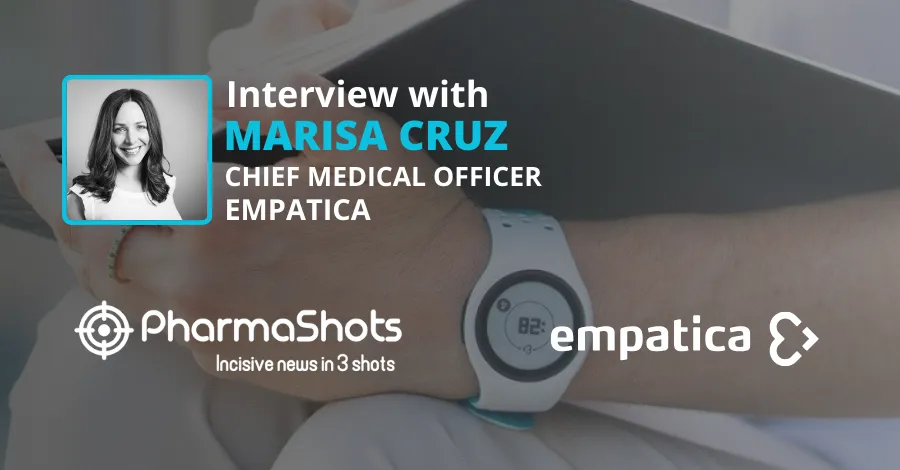Marisa Cruz, in an insightful conversation with PharmaShots, discusses the Empatica Health Monitoring Platform (EHMP)
Shots:
- Marisa Cruz, MD, and Chief Medical Officer at Empatica, exchanged thoughts with PharmaShots on the revolutionary Empatica Health Monitoring Platform (EHMP)
- Approved by the FDA in Nov’2022, EHMP leverages a cloud-based online portal to collect continuous and seamless physiological data from home and clinical setting
- While conversing in great depth about Empatica’s EmbracePlus smartwatch, Marisa delves into the broad prospects that the EHMP platform offers as compared to conventional methods
Saurabh: Would you please highlight the details of the Empatica Health Monitoring Platform and how this platform eases the collection and streaming of accurate health data?
Marisa: The Empatica Health Monitoring Platform is designed to empower clinicians, researchers, and patients with real-time insights into human health driven by physiological and behavioral digital biomarkers. This FDA-cleared platform is a comprehensive remote health monitoring and data collection solution designed to ensure continuous, seamless collection of physiological data from home and clinic settings, made easily accessible to researchers and clinicians through a cloud-based online portal.
The platform includes Empatica’s medical-grade wearable device, EmbracePlus, as well as Empatica’s proprietary Care software suite, secure cloud infrastructure, and clinically validated digital biomarkers. EmbracePlus is the world’s most advanced smartwatch for continuous health monitoring and is equipped with a wide range of sensors including an advanced optical photoplethysmogram, electrodermal activity sensor, accelerometer and gyroscope, and digital temperature sensor.
Data from these sensors then serve as inputs to the trained and validated algorithms computing specific Empatica digital biomarkers. Platform users can access biomarker data aggregated at 1-min intervals, as well as raw sensor data. Thanks to the raw sensor data from EmbracePlus, the platform enables researchers to develop their own digital biomarkers for use as study endpoints.
Saurabh: Brief us about the study design and the outcomes based on which the US FDA has approved Empatica’s Health Monitoring Platform
Marisa: The Empatica Health Monitoring Platform (EHMP) was cleared by the FDA in November 2022 and enables continuous data collection to monitor blood oxygen saturation (SpO2) during rest, peripheral skin temperature, activity associated with movement during sleep, and Electrodermal Activity (EDA). The FDA has outlined the types of testing and performance standards needed to validate digital biomarkers, which can differ depending on the technology involved, and the intended use of the biomarker. Prospective clinical testing was required to evaluate the accuracy of the EHMP blood oxygen saturation (SpO2) measurement, as compared to the gold standard of arterial blood analysis. In twelve subjects representing a range of demographics and skin tones, the Empatica platform was demonstrated to have an accuracy of 2.6% Arms across a blood oxygen saturation range of 70-100%. This performance exceeded the requirements of an Arms of 3.5% or lower set by FDA and the International Standards Organization for pulse oximeters.
The remainder of the EHMP biomarkers were validated through bench testing, either performed internally by Empatica or by third-party accredited laboratories. In accordance with FDA guidelines, the full platform also underwent cybersecurity, electrical safety, and biocompatibility testing, as well as a Human Factor Validation study in which 15 lay users and 15 healthcare professionals tested the usability and safety of the platform. All clinical and bench testing results were submitted to the US FDA for independent review prior to market clearance. Please refer to the public available 510(k) summary available here: https://www.accessdata.fda.gov/cdrh_docs/pdf22/K221282.pdf pages 17-19.
Saurabh: Share some more insight into your digital biomarkers and the EmbracePlus smartwatch. How do they contribute to patient adherence and data collection during clinical trials?
Marisa: Digital biomarker data is collected continuously by the Empatica Health Monitoring Platform and then streamed to our cloud platform via the internet, enabling data to be visualized, analyzed, and downloaded in a conveniently accessible portal. Because data is collected passively and unobtrusively through a comfortable and lightweight smartwatch solution, our platform significantly reduces the amount of burden placed on the patient to collect and report their own health data, and minimizes the need for clinic-based, point-in-time clinical measurements. The patient-centric design of the EmbracePlus improves compliance with data collection protocols, as shown by a recent study conducted by Bristol Myers Squibb and Boston University that found patient adherence using the EHMP exceeded 90%.
Saurabh: How do you believe that Empatica’s Health Monitoring Platform will advance conventional methods of clinical trials or research studies?
Marisa: Our aim with the Empatica Health Monitoring Platform is to offer the best possible data for researchers, conveniently collected and accessible in a single platform, powered by a versatile set of sensors and a wide range of digital biomarkers. By delivering non-stop data collection, we are allowing researchers to truly observe changes over time and at a granular level, allowing them to conduct clinical research in real world settings, deriving important insights that may have otherwise been overlooked.
With our platform, we are able to address the needs of a changing landscape for clinical trials where decentralized trials are becoming the norm and where a diverse patient population is the expectation, all while improving the quality of data through increased retention and adherence and reduced reliance on point-in-time measurements of health parameters. On top of this, our approach results in data that is longer-lasting, less prone to error and potentially less expensive to collect than using traditional methods of this, and is easier, more durable and can cost less than more traditional methods of data collection.
Saurabh: Give us a comparative overview of how this platform has contributed to developing more targeted therapies and enhanced the understanding of patient physiology than the conventional methods.
Marisa: Digital biomarkers are relatively new and Empatica has been at the forefront of making them available for clinical trials. As of today, there are no approved medications that have used digital biomarkers as a primary endpoint for a pivotal trial but given our strong position and wide adoption in this space, we aim to power the first of these new medication approvals.
Conventional methods of clinical research rely on snapshots of a patient’s condition either captured in a clinical setting or reliant on patient self-reporting. With our EmbracePlus wearable providing continuous data to our cloud-based platform, researchers can see and analyze real-time changes across a number of biomarkers across a widely diverse set of patients. This offers an unparalleled and unprecedented level of granularity as clinicians and researchers seek to understand disease progression and treatment efficacy.
Saurabh: To ease the process of clinical trials, how widely is Empatica’s Health Monitoring Platform being used? What are some of the institutions and companies that are utilizing this platform?
Marisa: At Empatica, we collaborate with many of the most renowned research teams and organizations in the world. Hundreds of institutional partners across the pharmaceutical, academic, and research industry sectors are currently using our Empatica Health Monitoring Platform globally for clinical research, including much of the top 20 pharmaceutical companies. Across numerous studies, our platform has been used to examine a wide range of areas including stress, sleep, epilepsy, migraine, depression, addiction, and more.
Other studies using the Empatica Health Monitoring Platform include Sleep Revolution, an interdisciplinary international research and development project aimed at developing a personalized diagnostic and therapeutic solution for sleep-disordered breathing (sleep apnea), and TIMESPAN, a study focused on the management of chronic cardiometabolic disease and treatment discontinuity in adult ADHD patients. Beyond this, Empatica’s technology has been used outside of clinical research and explored across a portfolio of diversified published research that demonstrates the broad range of use-cases our platform has. This includes enhancing understanding human metabolic processes in diabetes, electrodermal activity measurements for seizure detection, and the role of various physiological signal measurements for stress and anxiety.
Saurabh: How does Empatica make sure of data protection, privacy, and security for patient data collected during the studies and how is it being utilized after the study completion?
Marisa: Data protection and privacy are critical to Empatica and the Empatica Health Monitoring Platform is fully compliant with GDPR. This means that all collected user biomarker data is de-identified and not linked to the personal information of users. Users can request that their personal information be deleted at any time.
We also protect the patient’s data collected during studies using security measures that include pseudonymization and encryption of data in conjunction with controls designed to ensure ongoing confidentiality, integrity, availability, and resilience of data. Empatica tests the effectiveness of technical and organizational measures on a regular basis for ensuring the security of all these processes.
We do all of this because we know that privacy of health data is of the highest importance and critical to ensuring adoption of remote monitoring technologies like those offered by Empatica.
Image Source: Canva
About the Author

Marisa Cruz
Dr. Marisa Cruz is the Chief Medical Officer of Empatica, a company focused on developing digital biomarkers to improve research and clinical outcomes. She blends a passion for patient care with deep experience in digital health and regulatory policy, leveraging previous roles as the Chief Medical Officer of Limbix Health, the EVP of Regulatory and Clinical Affairs at Everly Health, and the Senior Medical Advisor for the Digital Health Unit at the US Food and Drug Administration. She received her M.D. from the Johns Hopkins School of Medicine, completed an Internal Medicine residency and Endocrinology fellowship at the University of California, San Francisco, and continues to actively practice medicine at UCSF.




